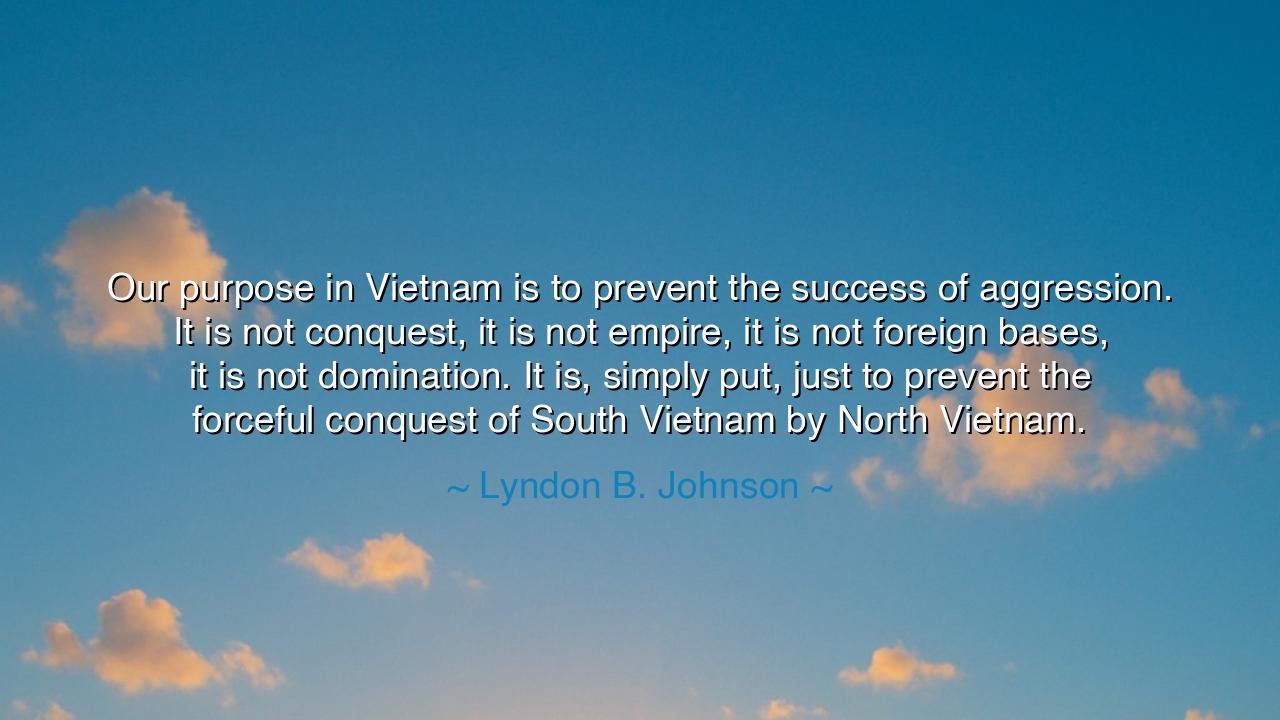
Our purpose in Vietnam is to prevent the success of aggression.
Our purpose in Vietnam is to prevent the success of aggression. It is not conquest, it is not empire, it is not foreign bases, it is not domination. It is, simply put, just to prevent the forceful conquest of South Vietnam by North Vietnam.






The voice of a leader burdened with war, Lyndon B. Johnson, thundered these words to the American people and to the world: “Our purpose in Vietnam is to prevent the success of aggression. It is not conquest, it is not empire, it is not foreign bases, it is not domination. It is, simply put, just to prevent the forceful conquest of South Vietnam by North Vietnam.” These words were spoken in the heat of history, not as idle speech, but as the justification of a great and terrible conflict. They echo with the eternal dilemma of nations: how to defend freedom without falling into the snare of empire, how to wield power without being consumed by it.
To speak of preventing aggression is to speak of resistance against forceful domination. Johnson presented the war not as an act of conquest, but as a defense against conquest. He framed America’s role as guardian, not tyrant. In his vision, the United States was not seeking lands, treasures, or thrones, but striving to stop the spread of tyranny. Thus, he sought to root America’s purpose not in ambition, but in duty—a duty to shield the weak against the strong, to prevent the fall of South Vietnam beneath the weight of Northern arms.
Yet his words—“it is not conquest, it is not empire”—betray the shadow that haunted his age. For history is filled with conquerors who clothed their ambition in the garments of protection, who called their wars defensive while planting their banners on foreign soil. Johnson’s insistence was an effort to distance America from that long tradition of empire. He wished to convince his people, and the world, that this war was not Rome reaching for dominion, nor Britain stretching for colonies, but a stand against the advance of hostile power.
History has seen such claims before. Consider Pericles of Athens, who declared that the Delian League was a defense pact to protect Greece from Persia. Yet in time, Athens wielded it as an instrument of empire, extracting tribute, expanding power, and ruling the seas. The Athenians told themselves they fought to defend liberty, but history remembers that they too became an empire. Johnson’s words thus echo an ancient paradox: when a great power intervenes abroad, is it defender, or is it conqueror?
And yet, though critics challenged him, the heart of Johnson’s declaration lies in a noble principle: that nations should not fall by force. He believed that if aggression went unchecked in Vietnam, it would embolden tyranny elsewhere, that small nations would no longer trust the promises of allies, and that freedom would wither beneath the shadow of conquest. Whether one agrees or not with his war, the truth remains: aggression breeds instability, and unchecked force devours the rights of the weak.
The lesson for us is profound. In our own lives, too, we must ask: are we motivated by conquest or by protection? Do we act from greed or from duty? It is easy to deceive ourselves, to clothe ambition in the garments of righteousness. But the truly noble act is one done without desire for domination, one done to defend, to uplift, to shield the vulnerable from harm. Johnson’s words call us to examine not only the actions we take, but the motives that drive them.
Practically, this means: when confronted with conflict, seek the heart of your purpose. If your goal is domination, know that it will in time consume you. If your goal is protection, act with restraint, humility, and clarity, so that your defense does not become another’s oppression. In daily life, defend the weak, resist aggression, but do not let your shield become a sword of conquest.
So let Johnson’s declaration endure, not only as a fragment of war, but as a timeless warning and teaching: true purpose is not conquest, not empire, not domination, but the prevention of aggression and the defense of freedom. Whether in nations or in souls, let us strive always to protect rather than to subdue, to guard rather than to seize. For in that restraint lies the true measure of justice, and in that justice lies the hope of peace.






AAdministratorAdministrator
Welcome, honored guests. Please leave a comment, we will respond soon